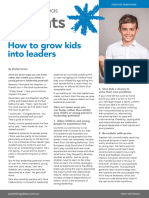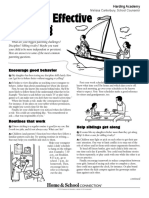0% found this document useful (0 votes)
96 views7 pagesParenting for Raising Successful Kids
The document discusses effective parenting strategies aimed at raising successful children, emphasizing the importance of trust, independence, and self-expression. It highlights the need for parents to guide rather than control their children, allowing them to explore their passions while fostering a strong parent-child connection. The text also stresses the significance of patience and understanding that each child develops at their own pace, encouraging parents to focus on effort and skills rather than innate intelligence.
Uploaded by
mukhilj3332Copyright
© © All Rights Reserved
We take content rights seriously. If you suspect this is your content, claim it here.
Available Formats
Download as DOCX, PDF, TXT or read online on Scribd
0% found this document useful (0 votes)
96 views7 pagesParenting for Raising Successful Kids
The document discusses effective parenting strategies aimed at raising successful children, emphasizing the importance of trust, independence, and self-expression. It highlights the need for parents to guide rather than control their children, allowing them to explore their passions while fostering a strong parent-child connection. The text also stresses the significance of patience and understanding that each child develops at their own pace, encouraging parents to focus on effort and skills rather than innate intelligence.
Uploaded by
mukhilj3332Copyright
© © All Rights Reserved
We take content rights seriously. If you suspect this is your content, claim it here.
Available Formats
Download as DOCX, PDF, TXT or read online on Scribd
/ 7































































































































